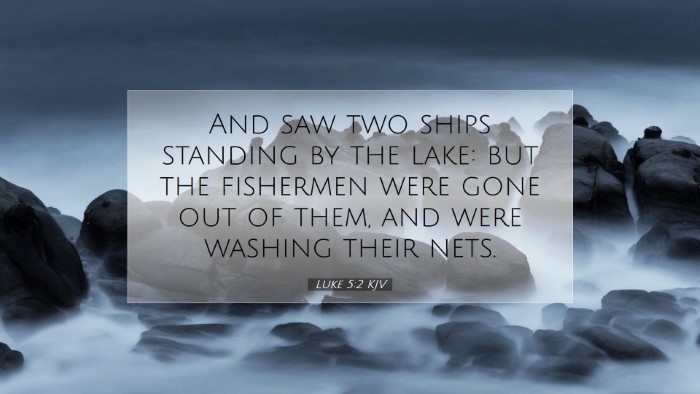Bible Commentary on Luke 5:2
Luke 5:2 states, "And saw two boats standing by the lake; but the fishermen had gone from them and were washing their nets." This brief but profound verse sets the stage for a significant moment in the ministry of Christ. In order to understand its implications, we can draw insights from various public domain commentaries, exploring the cultural and theological layers embedded in this scene.
Contextual Analysis
In the context of the Gospel of Luke, this moment occurs shortly after Jesus begins His public ministry. The Kyrios (Lord) is attracting attention, and people are eager to hear His teachings. However, this particular verse brings us to a quieter moment by the Sea of Galilee, where the activities of common fishermen provide a narrative depth that is often overlooked.
Matthew Henry's Insights
Matthew Henry, in his comprehensive commentary, emphasizes the significance of the setting. He suggests that the presence of two fishing boats represents the duality of human effort versus divine activity:
- The boats as symbols: The boats symbolize the routine and struggle of everyday labor. The fishermen being absent denotes the moment of pause or transition before divine intervention.
- The act of washing nets: Washing the nets is more than a simple task; it represents the end of effort and the beginning of expectation as the fishermen prepare for the next opportunity.
Albert Barnes’ Perspective
Albert Barnes provides a more detailed examination of the fishermen's condition at this time:
- A moment of reflection: Barnes mentions that the act of washing their nets can be interpreted as a moment of reflection after a potentially fruitless night of fishing. It embodies feelings of weariness and yet the hope of a new beginning.
- Symbol of readiness: He warns that this preparatory work illustrates the readiness required for divine calling. The fishermen's mundane task becomes fertile ground for a greater purpose to be unfolded.
Adam Clarke’s Commentary
Adam Clarke offers a rich analysis focusing on the cultural and vocational implications behind this verse:
- Fishing in Jewish culture: Clarke notes that fishing is an essential trade for many in the Galilean region, linking the disciples' economic backstory to their eventual calling.
- Sign of divine purpose: He asserts that their work while being called would soon take on a divine purpose, suggesting that every secular occupation can become sacred in the hands of God.
Theological Implications
This scene serves as a poignant reminder of how God often meets us in our ordinary circumstances.
- God's pursuit of humanity: The passage demonstrates God's willingness to interact with humanity where they are, emphasizing His divine strategy in reaching out to the ordinary folk and transforming them into instruments of His mission.
- The call to readiness: The fishermen had to be ready for Jesus' call, echoing themes of being spiritually alert and prepared for the work God may have in store.
Practical Applications
For pastors, students, and theologians, this verse encourages a contemplation of our own callings:
- Understanding ordinary moments: One might explore how ordinary moments in life can be transformative when we open ourselves to God’s leading.
- Reflection on preparation: The careful washing of nets can be seen as a metaphor for spiritual preparation in ministry – engaging in practices that ready us for God’s use.
- Listening for God's voice: Just as the fishermen were initially engaged in their tasks, we too are encouraged to listen for God amidst our daily responsibilities.
Conclusion
Luke 5:2 encapsulates a profound moment where the mundane meets the miraculous. Through insights drawn from the commentaries of Matthew Henry, Albert Barnes, and Adam Clarke, we are reminded of the significance of Jesus’ interactions with ordinary people engaged in their routine tasks. It teaches pastors, students, and scholars to find the sacred in the ordinary, the meaning in the mundane, and to be ever-ready for the call to service that may come at any time. Such moments challenge us to reflect on our own lives and remain spiritually attuned to the transformative work God is doing around us.


